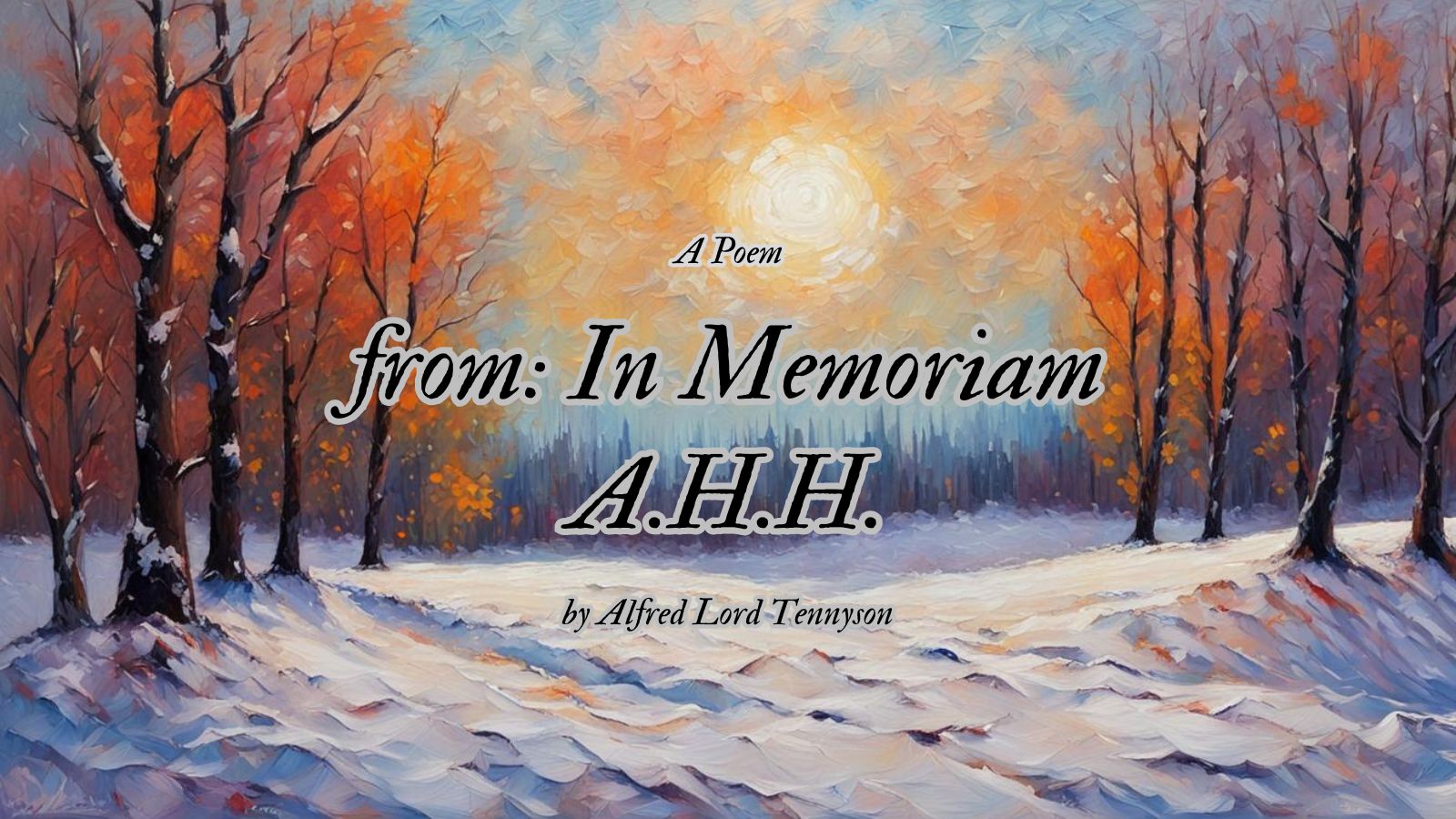from: In Memoriam A.H.H. by Alfred Lord Tennyson

from: In Memoriam A.H.H.
by Alfred Lord Tennyson
XXVIII
The time draws near the birth of Christ:
The moon is hid; the night is still;
The Christmas bells from hill to hill
Answer each other in the mist.
Four voices of four hamlets round,
From far and near, on mead and moor,
Swell out and fail, as if a door
Were shut between me and the sound:
Each voice four changes on the wind,
That now dilate, and now decrease,
Peace and goodwill, goodwill and peace,
Peace and goodwill, to all mankind.
This year I slept and woke with pain,
I almost wish’d no more to wake,
And that my hold on life would break
Before I heard those bells again:{46}
But they my troubled spirit rule,
For they controll’d me when a boy;
They bring me sorrow touch’d with joy,
The merry merry bells of Yule.
XXIX
With such compelling cause to grieve
As daily vexes household peace,
And chains regret to his decease,
How dare we keep our Christmas-eve;
Which brings no more a welcome guest
To enrich the threshold of the night
With shower’d largess of delight,
In dance and song and game and jest.
Yet go, and while the holly boughs
Entwine the cold baptismal font,
Make one wreath more for Use and Wont
That guard the portals of the house;
Old sisters of a day gone by,
Gray nurses, loving nothing new;
Why should they miss their yearly due
Before their time? They too will die.
XXX
With trembling fingers did we weave
The holly round the Christmas hearth;
A rainy cloud possess’d the earth,
And sadly fell our Christmas-eve.
At our old pastimes in the hall
We gambol’d, making vain pretence
Of gladness, with an awful sense
Of one mute Shadow watching all.
We paused: the winds were in the beech:
We heard them sweep the winter land;
And in a circle hand-in-hand
Sat silent, looking each at each.
Then echo-like our voices rang;
We sung, tho’ every eye was dim,
A merry song we sang with him
Last year: impetuously we sang:{49}
We ceased: a gentler feeling crept
Upon us: surely rest is meet:
‘They rest,’ we said, ‘their sleep is sweet,’
And silence follow’d, and we wept.
Our voices took a higher range;
Once more we sang: ‘They do not die
Nor lose their mortal sympathy,
Nor change to us, although they change;
Rapt from the fickle and the frail
With gather’d power, yet the same,
Pierces the keen seraphic flame
From orb to orb, from veil to veil.
Rise, happy morn, rise holy morn,
Draw forth the cheerful day from night:
O Father! touch the east, and light
The light that shone when Hope was born.’
LXXVI
Again at Christmas did we weave
The holly round the Christmas hearth,
The silent snow possess’d the earth,
And calmly fell our Christmas-eve;
The yule-clog sparkled keen with frost,
No wing of wind the region swept,
But over all things brooding slept
The quiet sense of something lost.
As in the winters left behind,
Again our ancient games had place,
The mimic pictures breathing grace,
And dance and song and hoodman-blind.
Who show’d a token of distress?
No single tear, no type of pain:
O sorrow, then can sorrow wane?
O grief, can grief be changed to less?{107}
O last regret, Regret can die!
No—mixt with all this mystic frame,
Her deep relations are the same,
But with long use her tears are dry.
CIII
This holly by the cottage-eave,
To night, ungather’d, shall it stand:
We live within the stranger’s land,
And strangely falls our Christmas eve.
Our father’s dust is left alone
And silent under other snows:
There in due time the woodbine blows,
The violet comes, but we are gone.
No more shall wayward grief abuse
The genial hour with mask and mime;
For change of place, like growth of time,
Has broke the bond of dying use.
Let cares that petty shadows cast,
By which our lives are chiefly proved,
A little spare the night I loved,
And hold it solemn to the past.{161}
But let no footstep beat the floor,
Nor bowl of wassail mantle warm;
For who would keep an ancient form
Through which the spirit breathes no more?
Be neither song, nor game, nor feast,
Nor harp be touch’d, nor flute be blown;
No dance, no motion, save alone
What lightens in the lucid east
Of rising worlds by yonder wood.
Long sleeps the summer in the seed;
Run out your measur’d arcs, and lead
The closing cycle rich in good.
Alfred Lord Tennyson is considered one of the greatest English poets of the Victorian era. He was born in 1809 in England. His early poems were largely influenced by the times—his famous poem “The Lady of Shalott” is set in King Arthur’s Camelot, showing his early interest in medieval themes. Tennyson continued writing and expanding his catalog of poems. In 1850, he was appointed the Poet Laureate of Great Britain and Ireland. Two years later, upon the death of William Wordsworth, Tennyson officially assumed the role of Poet Laureate. Some of his most famous poems are ‘In Memoriam’, ‘Idylls of the King’, and ‘Tithonus’. While Tennyson garnered fame and accolades in his home country, his reputation eventually spread across the globe. Much of his poetry focused on grief, loss, doubt, and faith. Despite periods of deep sadness, Tennyson maintained an unwavering faith throughout his life. His poems explore complex themes in mystical ways, allowing readers to uncover new interpretations with each reading. Though he passed in 1892, Tennyson’s works continue to inspire and connect deeply with readers over 150 years later.